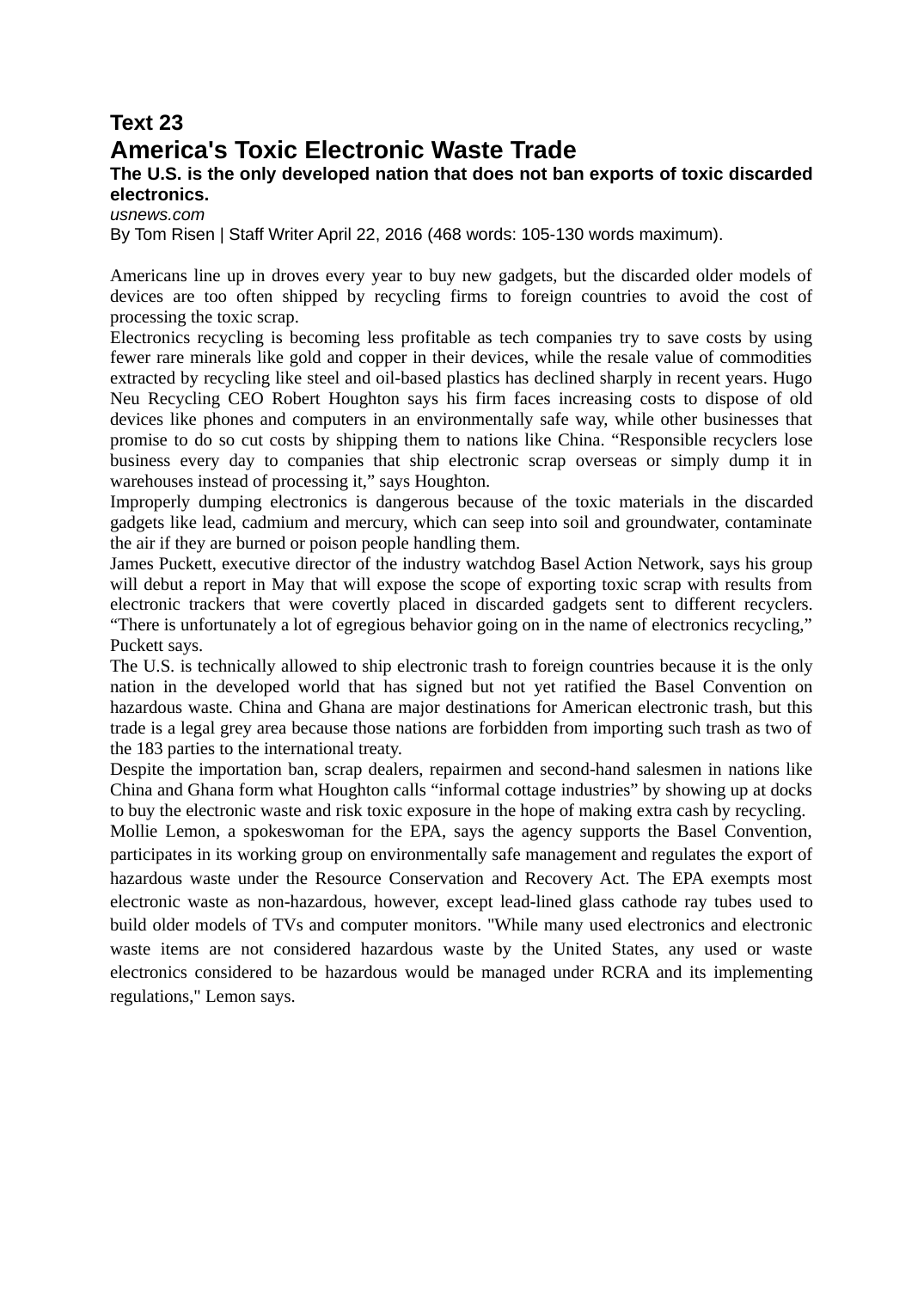America's Toxic Electronic Waste Trade
Publié le 23/05/2020

Extrait du document
«
Text 23
America's Toxic Electronic Waste Trade
The U.S.
is the only developed nation that does not ban exports of toxic discarded
electronics.
usnews.com
By Tom Risen | Staff Writer April 22, 2016 (468 words: 105-130 words maximum).
Americans line up in droves every year to buy new gadgets, but the discarded older models of
devices are too often shipped by recycling firms to foreign countries to avoid the cost of
processing the toxic scrap.
Electronics recycling is becoming less profitable as tech companies try to save costs by using
fewer rare minerals like gold and copper in their devices, while the resale value of commodities
extracted by recycling like steel and oil-based plastics has declined sharply in recent years.
Hugo
Neu Recycling CEO Robert Houghton says his firm faces increasing costs to dispose of old
devices like phones and computers in an environmentally safe way, while other businesses that
promise to do so cut costs by shipping them to nations like China.
“Responsible recyclers lose
business every day to companies that ship electronic scrap overseas or simply dump it in
warehouses instead of processing it,” says Houghton.
Improperly dumping electronics is dangerous because of the toxic materials in the discarded
gadgets like lead, cadmium and mercury, which can seep into soil and groundwater, contaminate
the air if they are burned or poison people handling them.
James Puckett, executive director of the industry watchdog Basel Action Network, says his group
will debut a report in May that will expose the scope of exporting toxic scrap with results from
electronic trackers that were covertly placed in discarded gadgets sent to different recyclers.
“There is unfortunately a lot of egregious behavior going on in the name of electronics recycling,”
Puckett says.
The U.S.
is technically allowed to ship electronic trash to foreign countries because it is the only
nation in the developed world that has signed but not yet ratified the Basel Convention on
hazardous waste.
China and Ghana are major destinations for American electronic trash, but this
trade is a legal grey area because those nations are forbidden from importing such trash as two of
the 183 parties to the international treaty.
Despite the importation ban, scrap dealers, repairmen and second-hand salesmen in nations like
China and Ghana form what Houghton calls “informal cottage industries” by showing up at docks
to buy the electronic waste and risk toxic exposure in the hope of making extra cash by recycling.
Mollie Lemon, a spokeswoman for the EPA, says the agency supports the Basel Convention,
participates in its working group on environmentally safe management and regulates the export of
hazardous waste under the Resource Conservation and Recovery Act.
The EPA exempts most
electronic waste as non-hazardous, however, except lead-lined glass cathode ray tubes used to
build older models of TVs and computer monitors.
"While many used electronics and electronic
waste items are not considered hazardous waste by the United States, any used or waste
electronics considered to be hazardous would be managed under RCRA and its implementing
regulations," Lemon says..
»
↓↓↓ APERÇU DU DOCUMENT ↓↓↓


